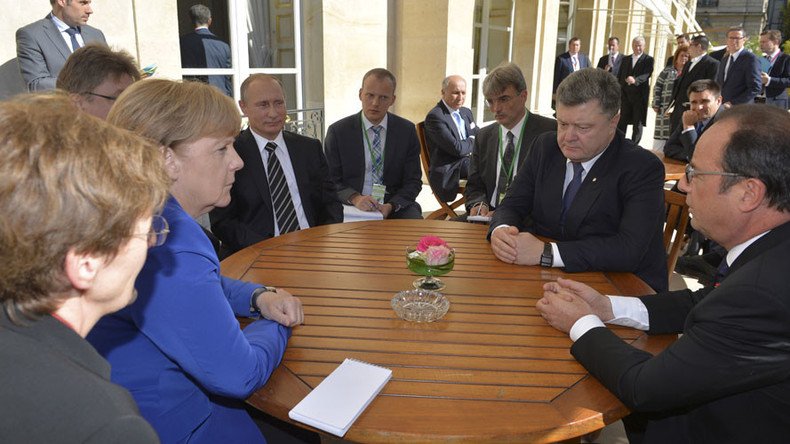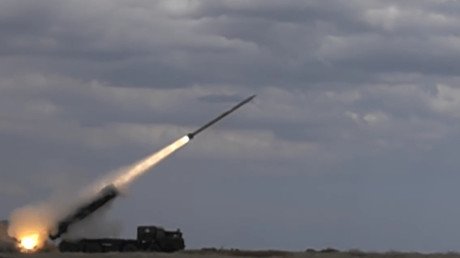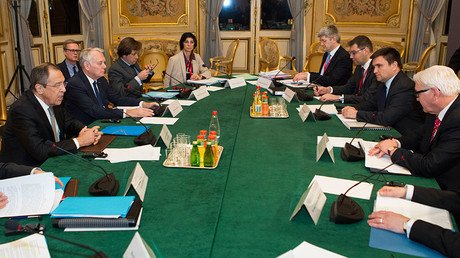Putin, Merkel, Hollande & Poroshenko to discuss Ukraine crisis at Berlin meeting

The leaders of Russia, Germany, France and Ukraine are to discuss the ongoing conflict in eastern Ukraine in Berlin on Wednesday. The ‘Normandy Four’ initially brokered a ceasefire for Ukraine in February 2015, but it was never fully implemented.
The meeting on Wednesday will be the first time Russian President Vladimir Putin has visited the German capital since the political crisis in Ukraine began in 2014. He will discuss the situation in the struggling country with host Chancellor Angela Merkel, French President Francois Hollande and Ukraine’s leader, Petro Poroshenko.
“It’s been a month since the meeting in Paris. The work of aides has shown that it is time to compare notes, and that is what will happen,” Kremlin spokesman Dmitry Peskov said ahead of the meeting.
“So far it would be premature to talk about any concrete agreements,” he added, mirroring the pessimism of President Poroshenko, who said he had little hope for a breakthrough in Berlin.
"One mustn't expect any wonders from tomorrow's meeting but it is worth every endeavor on this issue to take efforts forward," Chancellor Merkel also told a news conference on Tuesday.
After an armed coup in Kiev in 2014, several of its regions rejected the new government, which has nationalistic and anti-Russian leanings. Crimea voted in a referendum to rejoin Russia, while the eastern regions of Donetsk and Lugansk opted for broader autonomy. Kiev responded by launching a military crackdown on the rebels.
Ukraine and its foreign sponsors accused Russia of stirring the conflict in the east by sending troops and weapons there, an allegation that Moscow denied.
The bloodshed in eastern Ukraine, which according to UN estimates claimed around 9,000 lives in more than two years, was somewhat reduced by the Minsk agreement – the ceasefire deal between Kiev and the rebels brokered in the Belarus capital by Russia, Germany and France. The deal, however, failed to resolve the conflict and remains a controversial issue in Ukraine.
The terms of the ceasefire require Ukraine to take a number of political steps, including pardoning the rebels, changing the constitution to give more autonomy to the two rebellious regions, and accepting the results of elections which would likely make a number of rebel leaders members of the Ukrainian parliament. The rebels agreed to hand over to the Ukrainian military control of their border with Russia on the day following the election.
But senior officials in Ukraine insist that they would not deliver on their part of the bargain until Kiev is in full control of the border, which runs contrary to the terms. The government is pressured by Ukrainian nationalists, who reject the Minsk deal and threaten to riot, should the government try to implement it.
"Indeed, the security situation along the demarcation line leaves a lot to be desired, provocations are ongoing," Peskov said on Tuesday. "Of course, all this does not promote the process of achieving the implementation of the Minsk agreements."
The conflict has occasionally resulted in almost farcical episodes. Last week, President Hollande sparked outrage in Ukraine by citing at a PACE session the terms of the Minsk deal as they are, rather than as Kiev would like them to be. Among those rebuking the French leader was Ukrainian Interior Minister Arsen Avakov, who said Hollande was in no position “to dictate to us what to do.”
French Foreign Minister Jean-Marc Ayrault, speaking in Paris on Tuesday, stressed again there was no alternative to continuing to work on the Minsk agreement.
"I told the Ukrainians there was no plan B to the Minsk accords. Some think there is a plan B, which is confronting Russia, which we don't want."
The meeting in Berlin comes amid a period of high tension between Russia and France, which clashed over Syria at a UN Security Council session. The Syrian conflict, however, will not be on the agenda on Wednesday, the Kremlin said.














